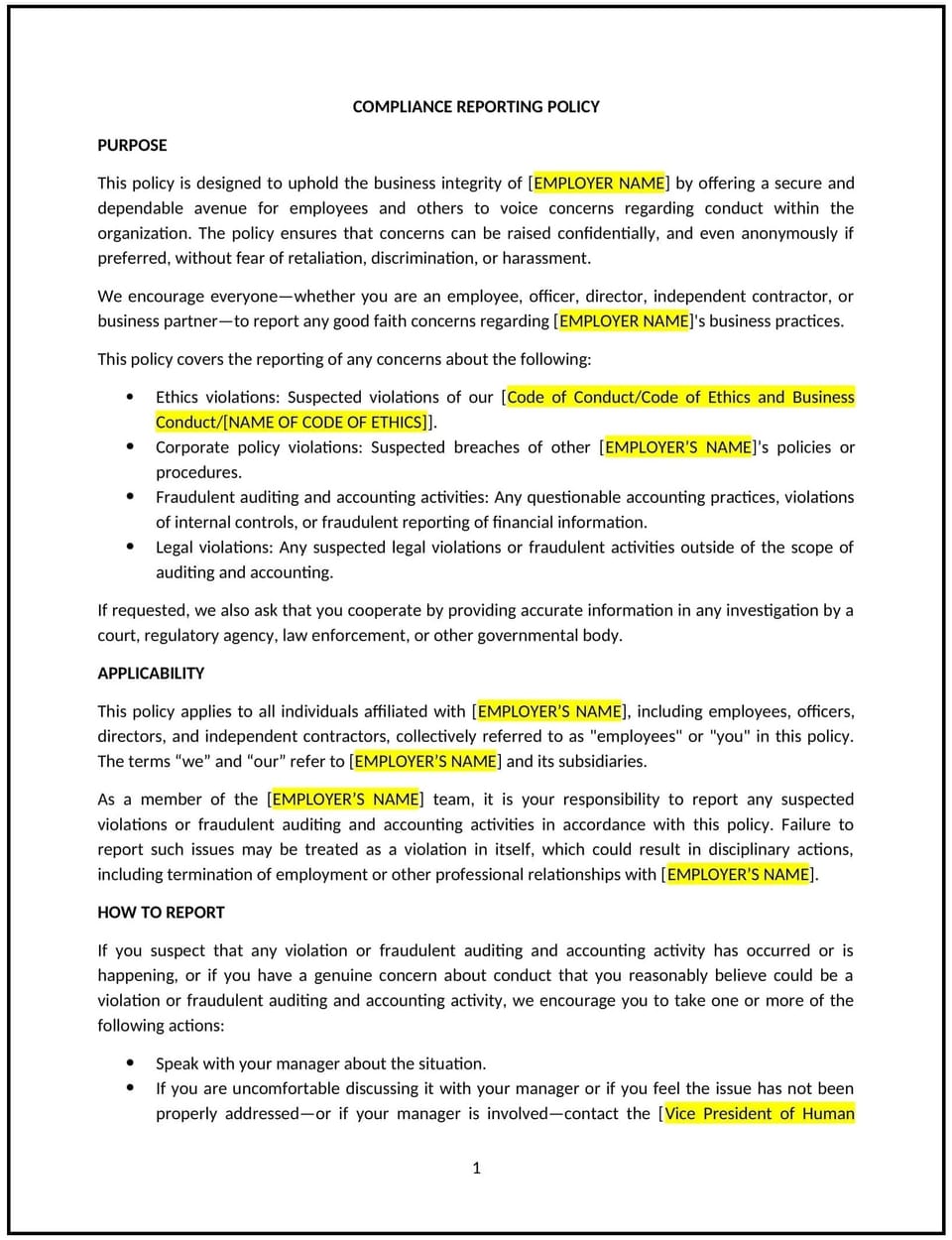Compliance reporting policy (Vermont): Free template

Compliance reporting policy (Vermont)
This compliance reporting policy is designed to help Vermont businesses promote ethical practices and ensure adherence to applicable laws, regulations, and internal policies. It provides guidelines for reporting, investigating, and addressing compliance concerns while protecting employees from retaliation.
By adopting this policy, businesses can foster a culture of transparency, accountability, and integrity.
How to use this compliance reporting policy (Vermont)
- Define compliance concerns: Specify the types of issues covered by this policy, such as violations of laws, company policies, safety standards, or ethical practices.
- Establish reporting procedures: Provide clear instructions for employees to report compliance concerns, including contact details for HR, compliance officers, or anonymous reporting systems.
- Include investigation protocols: Outline steps for investigating reported concerns, including confidentiality, timelines, and corrective actions.
- Emphasize non-retaliation: Guarantee protection for employees who report concerns in good faith, ensuring they are not subject to retaliation or adverse consequences.
- Promote training and awareness: Educate employees on their responsibilities to report compliance concerns and the resources available to them.
- Address recordkeeping: Require documentation of reported concerns, investigation outcomes, and any corrective actions taken to ensure transparency.
- Monitor compliance: Regularly review and update compliance reporting practices to align with Vermont laws and company standards.
Benefits of using this compliance reporting policy (Vermont)
This policy provides several benefits for Vermont businesses:
- Promotes ethical behavior: Encourages employees to report concerns and uphold the company’s values.
- Enhances transparency: Establishes a structured process for addressing compliance concerns openly and fairly.
- Aligns with legal standards: Ensures adherence to Vermont laws and industry regulations, minimizing legal risks.
- Protects employees: Safeguards employees from retaliation for reporting concerns in good faith.
- Supports accountability: Provides a framework for investigating and resolving compliance issues effectively.
Tips for using this compliance reporting policy (Vermont)
- Communicate the policy: Share the policy with employees during onboarding and make it accessible in the employee handbook or on the company intranet.
- Provide training: Offer regular training sessions on compliance obligations and reporting procedures.
- Encourage reporting: Foster a workplace culture where employees feel comfortable raising concerns without fear of retaliation.
- Document reports: Maintain detailed records of reported concerns and investigations to ensure transparency and accountability.
- Update regularly: Revise the policy to reflect changes in Vermont laws, workplace practices, or regulatory requirements.
Q: What types of issues should employees report under this policy?
A: Employees should report violations of laws, company policies, ethical standards, safety protocols, or any other compliance-related concerns.
Q: How can employees report compliance concerns?
A: Employees can report concerns through designated channels, such as HR, a compliance officer, or an anonymous reporting system.
Q: Are employees protected from retaliation for reporting concerns?
A: Yes, employees who report concerns in good faith are fully protected from retaliation or adverse actions under this policy and Vermont law.
Q: What happens after a compliance concern is reported?
A: The company will conduct a prompt, confidential investigation, take appropriate corrective actions, and notify the reporting employee of the outcome as applicable.
Q: Are compliance reports kept confidential?
A: Yes, all reports are handled confidentially, with information shared only on a need-to-know basis during investigations.
Q: Is training on compliance reporting mandatory?
A: Yes, employees and managers are required to participate in training to ensure awareness of their compliance responsibilities and reporting procedures.
Q: How often is this policy reviewed?
A: This policy is reviewed annually or whenever significant changes occur in Vermont laws or workplace practices.
Q: Can contractors and third parties report compliance concerns?
A: Yes, contractors and third parties are encouraged to report concerns through the same reporting channels as employees.
This article contains general legal information and does not contain legal advice. Cobrief is not a law firm or a substitute for an attorney or law firm. The law is complex and changes often. For legal advice, please ask a lawyer.


